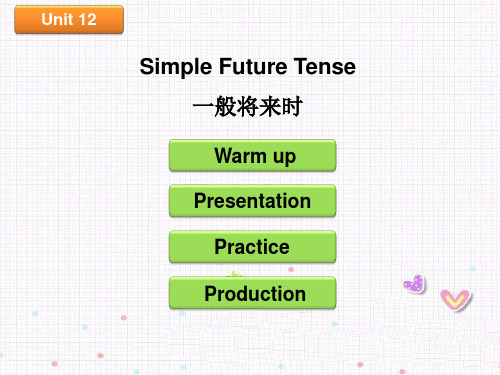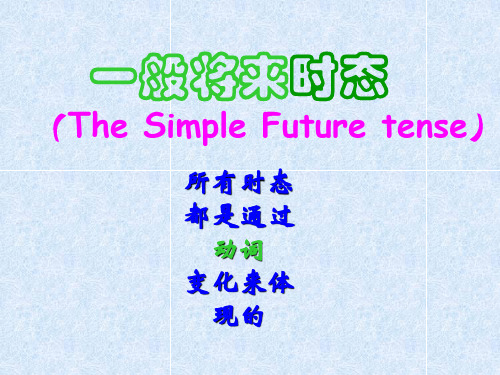一般将来时课件(很全面,强烈推荐)
一般将来时课件(PPT)

“be able to”表示将来有能力做某 事时,使用一般将来时形式,例如“I will be able to help you”。
情态动词如“can”、“may”、 “must”等,在一般将来时中通常直 接加动词原形,例如“I can swim”。
03
一般将来时在句子中的运用
陈述句中的使用
表示将要发生的动作或存在的状态
纠正方法
应使用正确的将来时形式,如 "He will go to the park tomorrow." 或 "He is going to the park tomorrow."
忽略动词变化规则
错误示例
They will play football in the future.(忽略了动词play在将来时中的变化)
纠正方法
在将来时中,应使用正确的助动词或情态动词形式,如 "I will be able to help you with your homework." 或 "I can help you with your homework."
错误示例
He will must finish his work before leaving.(错误地使 用了情态动词must)
作用
用于表示未来的计划、打算、预测、 假设等。
常见表达形式
will + 动词原形
表示将来的动作或状态,如“I will go to the park tomorrow.”(我明天将去公园。)
be going to + 动词原形
表示计划、打算或即将发生的动作,如“I am going to study hard this semester.”(我这 学期打算努力学习。)
一般将来时PPT课件

•一般将来时基本概念•一般将来时结构与用法•一般将来时时间状语及标志词•一般将来时与其他时态对比•一般将来时在各类从句中运用•一般将来时误区及注意事项•总结回顾与拓展延伸目录01一般将来时基本概念定义与特点定义特点表现形式will + 动词原形be going to + 动词原形现在进行时表示将来预测未来计划与安排条件与假设030201使用场景02一般将来时结构与用法主语+ be not going to + 动词原形+ 其他成分主语+ be to not (非标准用法,尽量避免使用) + 动词原形+ 其他成分主语+ will not (won't) + 动词原形+ 其他成分Will + 主语+ 动词原形+ 其他成分?Be + 主语+ going to + 动词原形+ 其他成分?Be + 主语+ to + 动词原形+其他成分?(较少使用,多用于书面语)特殊疑问词动词原形特殊疑问词going to +成分?特殊疑问词to +(较少使用,多用于书面语)注意:在一般将来时的使用中,要注意区分不同语境和表达方式的细微差别,选择合适的结构进行表达。
同时,也要注意与其他时态的区分和联系,避免混淆使用。
特殊疑问句结构03一般将来时时间状语及标志词常见时间状语表示将来的时间状语表示计划或安排的时间状语标志词识别与运用04一般将来时与其他时态对比与现在进行时对比时间指向不同01动词形式差异02使用情境不同03时间基准差异动词形式变化使用情境区别时间范围不同动词形式区别使用情境差异05一般将来时在各类从句中运用在宾语从句中运用01 02定语从句的时态取决于它所修饰的先行词,如果先行词是将来时态,定语从句也使用将来时态。
如果先行词是过去将来时,定语从句则使用过去将来时。
定语从句中表示将来的时间状语有:tomorrow, next year, in the future 等。
06一般将来时误区及注意事项误区二过度使用“will”和“going to”。
通用版英语六年级下册一般将来时 课件 (共43张PPT)

tomorrow明天 tomorrow morning 明天早上 tomorrow afternoon 明天下午 tomorrow evening明天晚上 the day after tomorrow后天
next 系列
next time下次 next week下周 next month下个月 next summer/winter holida明年暑假/寒假 next year明年
B. going
C. goes
D. went
Summary
1.掌握一般将来时的定义 2.掌握一般将来时的结构 3.掌握一般将来时的时间标志词 4.掌握be going to+动原 和will+动原的区别 5.掌握一般将来时的句型转换 6.掌握一般将来时 的特殊用法
特殊疑问句 :特殊疑问词 + 一般疑问句?
1 I am going to swim tomorrow. What are you going to do tomorrow?
2 I am going to swim with my brother tomorrow. Who are you going to swim with tomorrow?
即学即练
4.He will paint it pink. (一般疑问句) Will he paint it pink?
5. There will be a sports meeting next week.(否定句) There will not be a sports meeting next week.
in+将来的年份(在…….年)
in+时间段 表示“m now on 从现在开始 in the future 在未来 in future 不久 before long不久之后 Soon 很快 Tonight在今晚 one day 有一天 some day某天 this afternoon/evening今天下午/晚上
一般将来时(9张PPT)初中英语专项复习课件

will句式总结:
肯定
否定
一般疑问
回答
I will have
I won`t have Will I have
Yes,I will.
many presents. many presents. many presents? No,I won`t.
He will travel He won`t travel Will he travel Yes, he will.
to Beijing.
to Beijing.
to Beijing?
No ,he won`t.
There will be fun in Xi`an.
There won`t be Will there be fun in Xi`an. fun in Xi`an.
Yes,there will. No,there won`t.
1、表示将来某一时刻的动作或状态: We will come to see you the day after tomorrow. There will be a wonderful show next week.
2、表示将来某一段时间内经常的动作或状态: The students will come and work in the lab once a week. We will come and work in this factory every year.
Some day people will go to the moon . 否定句:在will 的后面加not即可。will not 可缩写为 won’t
They won’t use books . 一般疑问句:把will 提到句子主语之前,结尾变问号。
初中英语 一般将来时课件(PPT18张)

Ⅳ.一般将来时的被动语态
一般将来时的被动语态表示“…将要被…”,其常用的表达形式有以下几种:
一般将来时被动语态:
will/shall + be /get done (表示意想不到的要发生的事情)
be going to be + done (表示按计划或安排发生的被动动作) be about to be + done (指将要发生的事情)
2.They ________ an English evening next Sunday. A. are having B. are going to have C. will having D. is going to have
3.—Tell him about the news when he _______, John.
考点2:考察一般将来时的不同表达方式
1.– Will his parents go to see the Terra Cotta Warriors tomorrow? – No, ________ (不去).
A. they willn’t. B. they won’t. C. they aren’t. D. they don’t.
基本结构:
1.主语+will/shall+do sth 2.主语+am/is/are+going to+do sth
3. 主表语示+位am移/is的/ar动e+词do可ing用s现th 在进行时表将来 4. 主特语定+时do间sth和条件状语从句可用一般将来时表将来
5.主语+am/is/are+(about)+to+do sth 注:之所以不用be是因为这是一般将来时,而be还包括过去式的 was、were
一般将来时PPT课件

05
解析
含有will的句子改为否定句时 ,在will后加not,缩写为 won't。
06
THANKS
感谢观看
06
一般将来时练习题精选与解析
选择题精选与解析
01
题目:I _______ to the cinema. Will you go with me?
02
A. go B. am going C. have gone D. went
选择题精选与解析
答案:B
解析:由后一句“Will you go with me?”可知是打算去做某事,是一般将来时,所以用现 在进行时表将来,选B。
题目:— What _______ you _______ to do tomorrow?
选择题精选与解析
— I _______ visit my uncle. A. are; going; am going B. are; going; am going to
C. are; going to; am going D. are; going to; am going to
区别
现在进行时强调当前正在进行的动作 或状态,而一般将来时则强调未来将 要发生的动作或状态。
联系
两者都可用于表示将来的情况,但侧 重点不同。现在进行时通过现在正在 进行的动作暗示将来,而一般将来时 则直接表达将来的动作或状态。
与过去将来时的区别与联系
区别
过去将来时表示从过去某一时间 看将要发生的动作或状态,而一 般将来时则是从现在看将来要发 生的动作或状态。
表示将来经常发生的动作或习惯
常用的时间状语
always, often, usually等 。
句子结构
一般将来时(8张PPT)初中英语专项复习课件

肯定句:主语+ will +do+其他 People will have robots in their homes. 否定句:主语+ will not /won't+do+其他 People will not/won’t have robots in their 一般疑问句:Will+主语+do+其他? 肯定回答:Yes, they will. 否定回答:No, they won’t. Will people have robots in their homes?
homes.
2.而be going to +do通常用来谈论在一个较近的未来将要发生的计 划中的或是有可能发生的事。如:
I am going to visit us next month.(在一个较近的未来将要发生 的计划中的事)
It is so cloudy. I think it’s going to rain. (有可能发生的事)
一般将来时
初中英语专项复习
一、一般将来时的意义: 用来描述一个即将要发生的动作;谈论未来的计划和打算。
二、一般将来时的基本结构: will/shall+动词原形
be going to+动词原形
常见时间状语:
next Tuesday next week the coming Sunday next year this afternoon
tomorrow tonight in a few minutes in the future in five years
三、一般将来时
1.will 用于一切人称,shall只用于第一人称(I/we)。但现代英语倾向 于所有人称都使用will而不用shall。will/shall + do通常用来谈论未 来会发生的事或是正在制定的计划。 It will rain this afternoon.(未来发生) I will take an umbrella with me.(计划)
《一般将来时》课件

be going to+动词原形
结构
主语+be going to+动词原形+其他 成分
例子
We are going to meet at the train station at 5:00.(我们计划在5点钟 在火车站见面。)
含义
表示计划或安排将来要发生的动作或 状态
用现在进行时表示
结构
主语+be+动词现在分词+ 其他成分
一般将来时可以用来表示对未来事件的预见或推测,通常与时间状语连用,如“in the future”、 “next year”等。例如,“It will rain tomorrow.”(明天会下雨。)
表示意图、打算或希望
总结词
表示个人的意图、打算或意图、打算或希望,通常与 表示意图的动词连用,如“plan”、“intend”、“hope” 等。例如,“I will visit my grandparents next week.”( 我打算下周去看望我的祖父母。)
含义
表示将来某个时间正在进 行的动作或状态
例子
He is coming here next week.(他下周将会来这 里。)
用一般现在时表示
结构
主语+动词原形+其他成分
含义
表示将来某个时间经常发生的动作或状态
例子
I do my homework every day.(我每天都会做作业。)
03
一般将来时的肯定句、否定句和 疑问句
感谢观看
基本构成
will + 动词原形
疑问句形式
Will + 主语 + 动词原形
否定句形式
一般将来时课件PPT.上课用

与“be going to + 动词原形”和“will + 动词原形”相比,“be about to + 动词原形”更强调即将发生的紧迫性。
04
一般将来时的否定形式
will not = won’t
01
"will not" 是 "will" 的否定形式 ,表示将来某个时间不会发生某 件事情。
明年这个时候我们将在巴黎度假。
表示未来的时间状语从句的连用
一旦你完成这个项目, 你就可以休息了。
即使明天下雨,我们 也会按时举行运动会。
只要他一回来,我们 就出发。
表示未来的时间状语从句的省略
明天见。 下周再见。
明天这个时候我们会在飞机上。
THANKS
主语 + will not + 动词原形 + 其他成分,例如:He will not come back until next month.(他下个月之前不会回来。)
Will + 主语 + 动词原形 + 其他成分,例如:Will you be available this afternoon?(你今天下午有空吗?)
表示预测和推测
总结词
一般将来时也可以用来表示对未来的预测和推测,通常基于 某种事实或证据。
详细描述
当我们根据已知事实或证据推断某件事情将在未来发生时, 可以使用一般将来时。例如,“根据天气预报,明天会下雨 ”表示对天气的预测,“根据市场趋势,明年房价可能会上 涨”表示对未来的推测。
表示意愿和打算
05
一般将来时的疑问形式
will + 主语 + 动词原形?
总结词
小学英语语法课件- 一般将来时 (共36张PPT) 全国通用

Presentation Sentences
She will take swimming lessons in this vacation. 她今年假期要去学游泳。 She is going to go shopping tomorrow. 她明天要去购物。 Jim will open a shop on internet. 吉姆打算要在网络上开个店。 Jim is going to be an actor when he grows up. Jim长大了想当一名演员。
___t_o_m_o_r_ro_w_.____________________________ 一般疑问句:A__re_t_h_e_c_h_il_d_re_n_g_o_i_ng__to__w_a_tc_h_a_d_o_l_p_h_in_s_h_o_w__
t_o_m_o_r_ro_w_?____________________________ There will be a great concert next week. 否定句:_T_h_e_r_e_w_il_l _n_o_t b_e__a_g_re_a_t_c_o_n_ce_r_t _n_ex_t_w_e_e_k_. ______ 一般疑问句:_W_i_ll_th_e_r_e_b_e_a_g_r_e_a_t _co_n_c_e_rt_n_e_x_t_w_e_e_k?______
Practice Oral Practice
小组合作完成单项选择,并朗读句子
( C ) There __________ a meeting tomorrow afternoon.
A. will be going to
B. will going to be
C. is going to be
一般将来时课件

表示预测和推测
总结词
表示预测和推测时,一般将来时用于描述对未来事件或情况 的预测或推测。
详细描述
在英语中,一般将来时也可以用于表示预测或推测,通常与 表示推测的副词连用,如"probably"、"possibly"、"likely" 等。例如,"It will probably rain tomorrow"表示明天可能 会下雨。
理解一般将来时在各 种语境中的应用。
学习方法
通过实例和练习,深入理解一 般将来时的语法规则和用法。
通过模仿和练习,提高口语和 书面表达能力。
结合实际语境,运用一般将来 时进行交流和表达。
01
一般将来时的定义 和结构
定义
定义
一般将来时是表示将来某个时间 将要发生的动作或存在的状态, 常常与表示将来的时间状语连用 ,如“明天”、“下周”等。
与条件状语从句连用
总结词
表示在满足一定条件下,未来将发生的 动作或状态。
VS
详细描述
在英语中,当句子与条件状语从句连用时 ,一般将来时可以用来表示在满足一定条 件下,未来将发生的动作或状态。常见的 条件状语从句包括"if"、"unless"、 "when"等。例如,"If it rains tomorrow, we will stay at home."表示 如果明天下雨,将会待在家里。
01
一般将来时的否定 形式
否定句型
ቤተ መጻሕፍቲ ባይዱ主语 + will not + 动词原形
表示主语将不会进行某个动作。例如,“He will not come tomorrow.”(他明天不会来。)
一般将来时ppt课件

表示预测和推测
预测
一般将来时可以用来表示对未来事件的 预测,例如“It will rain tomorrow”( 明天会下雨)。
VS
推测
在根据现有信息对未来进行推测时,也可 以使用一般将来时,例如“He will win the race”(他会赢得比赛)。
表示意愿和承诺
要点一
意愿
一般将来时可以用来表示个人的意愿和决定,例如“I will help you”(我会帮助你)。
be going to + 动词原形
用法
表示根据当前情况或计划,未来一定会发生的动作或状态。
例句
We are going to have a picnic next week.(我们下周要去 野餐。)
其他形式
用法
除了以上两种基本形式,还有其他一 些表达一般将来时的结构,如使用现 在进行时表示未来安排的动作等。
04 一般将来时的用 法
表示未来的计划和打算
计划
一般将来时可以用来表示未来的计划和打算,例如“I will go to the movies tonight”(我今晚会去看电影) 。
安排
在描述已经安排好的活动时,也可以使用一般将来时,例如“We are meeting at 3pm”(我们下午3点见面) 。
won’t go to the movies tonight.”(今晚我不会去看
电影。)
在“be going to”结构中, 否定形式为“am not going to”、“are not going to” 等。例如:“I am not going to the movies tonight.”(今晚我不打算去 看电影。)
要点二
承诺
英语一般将来时课件

7. If he _____ to college, he _____ a lot more. A. will go; will learn B. will go; is going to learn C. goes; will learn D. goes; is going to learn
is going to
are you going to
I feel terrible, I think I’m going to be sick. Look at the clouds! It’ s going to rain! (表示有迹象要发生某一动作时,要用be going to)
be going to与will的区别
will与shall+v
1.will与shall+v 1)表示一个将来的动作或状态,“要…,会…” She will go to the park tomorrow. 2)表示不以人的意志为转移的自然发展的事。 Tom will be 18 next year. Spring will come again. Tomorrow will be Sunday. 3) will+v 有时表示说话时的临时决定或打算。 --- My car won’t start. ---Don’t worry, I will come and give it a push.
结构
1.will+动词原形 (I /we shall) 2.be going to+动词原形 3.be+to do 表示计划,责任,约定或命令 4. be about to do sth 表示正要做…,马上要做... (不能与表示将来时间的状语连用) 5.be+doing 6.一般现在时表将来
一般将来时课件

相关语法点拓展
be going to结构
表示计划、打算或预测将要发生的动作,可与will互换使用。如:I am going to visit my grandparents next week. 我下周打算去看望我的祖父母。
现在进行时表将来
某些动词的现在进行时可以表示按计划或安排将要发生的动作,这类动词有come, go, leave, arrive等。如:We are leaving for Beijing tomorrow. 我们明天动身去北京。
例句2
She is going to buy a new car after she gets her salary.(她发工资后打算买一辆新车。)
分析
主句使用了“be going to”结构表示将来的打算,从 句使用了现在时“gets”,表示将来的某个时间点。
例句3
They are to meet at the school gate before the bell rings.(他们将在铃响前在学校门口集合。)
分析
主句使用了“be to”结构表示按计划将要发生的动作 ,从句使用了现在时“rings”,表示将来的某个时间 点。
04
条件状语从句与主句配合
条件状语从句引导词
01
02
03
04
if
表示某个条件,意为“如果” 。
unless
表示某个条件不成立,意为“ 除非”。
as long as
表示某个条件一直满足,意为 “只要”。
一般将来时的特殊疑问句
特殊疑问词 + will + 主语 + 动词 原形 + 其他?
易错难点剖析
will后接动词原形,而不是动词 的过去式或现在分词。
一般将来时课件(PPT)

现在进行时表示
总结词
表示现在正在进行的动作,暗示将来还会继 续
详细描述
现在进行时可以用来表示现在正在进行的动 作,并暗示将来还会继续。例如,“I am studying for the exam next week.”(我 正在为下周的考试学习。)
一般现在时表示
总结词
表示现在经常发生的动作或存在的状态,暗 示将来也会如此
详细描述
使用"will+动词原形"的结构来表示将来 某个时间点将要发生的动作或状态,例 如"I will go to the park tomorrow." (明天我将去公园)。
be going to+动词原形
总结词
表示计划或安排将来要发生的动作或状态。
详细描述
使用"be going to+动词原形"的结构来表示计划或安排将来要发生的动作或状 态,例如"I am going to have a party next weekend."(下周末我将举办一个 聚会)。
详细描述
使用“be going to+动词原形”的结构来表示计划或安排将来发生的动作,例如“We are going to have a par来某个时间正在进行的动作。
详细描述
使用现在进行时来表达将来某个时间正在进行的动作,例如“I am meeting my friend tomorrow” 。
一般将来时课件
目录
• 一般将来时的定义 • 一般将来时的句型结构 • 一般将来时的肯定句 • 一般将来时的否定句 • 一般将来时的疑问句
01
一般将来时的定义
什么是将来时态
01
一般将来时课件.上课用

缩写形式的一般疑问句
总结词
表示询问对方或第三方的行为或意愿,常用于口语或非正式场合。
详细描述
一般将来时的缩写疑问句形式为“'ll+动词原形”,例如“You'll come, won't you?”。这种形式常用于口语或 非正式场合,表示对对方行为的询问和推测。
特殊疑问句形式
总结词
表示询问具体信息,常用于询问某个具 体的时间、地点、人物等。
常见形式
基本形式
主语 + will + 动词原形,例如“I will go to the park tomorrow”。
进行形式
主语 + will be + 现在分词,例如 “She will be studying in the library this afternoon”。
完成形式
主语 + will have + 过去分词,例 如“They will have finished their work by the end of the week”。
例如:We won’t be late. (我们不会迟 到。)
用于口语或非正式场 合,更加简洁。
缩写形式
“won’t”是“will not”的缩写形 式,除了“won’t”外,还有其他常 用的缩写形式,如“shan’t”、 “needn’t”等。
在使用缩写形式时,需要注意语法和 语境的正确性,避免产生歧义或误解 。
02
一般将来时的用法
表示未来的计划和打算
计划和打算
一般将来时用于表示未来的计划和打 算,例如“我明天要去北京旅游”、 “我们下周要召开一个会议”等。
时安排
在描述时间安排时,一般将来时也经 常被使用,例如“明天下午三点有个 会议”、“下周五晚上有个聚会”等 。
(完整版)一般将来时课件(PPT)

2.与“next一家” 连用
next
time year week month term Monday at 7:00 next Sunday morning ……
6. He usually _g_e_t_s (get) up at 6 in the morning. Look! He i_s_g_e_t_t_in(gget) up now. But yesterday he _g_o_t_ (get) up very late, so he _w_e_n_t (go) to
①
②
③
① Who will have an English party next week ?
② What will they have next week ?
③ When will they have an English party?
2. be going to 表将来
will 和be going to 的区别
2.He will find some meat in the fridge soon. (变一般疑问句) W __i_ll he _f_in_d _a_n_y_ meat in the fridge?
3.She will stay there in a week. (对划线部分提问) __H_o_w _s_o_on_ w_i_ll__ she _s_t_a_y_ there?
good. 4.What time _w__ill_ you _g_e_t_ (get) to
一般将来时课件(PPT)

一般将来时的特殊疑问句形式
Will + 主语 + 动词原形 + 其他?,用于询 问将来某个时间是否会发生某个动作或存 在某个状态。
特殊疑问词 + will + 主语 + 动词原形 + 其 他?,用于对将来某个时间发生的动作或状 态进行具体询问。
相关语法点串联
与一般现在时的对比
一般现在时表示经常性、习惯性的动作或状态,而一般将 来时则表示将来某个时间要发生的动作或存在的状态。
01
2. 题目
They _____ (not visit) their grandparents next week.
03
3. 题目 you (have) a meeting next Monday?
05
02
解析
根据时间状语tomorrow可知,该句应用一 般将来时,填will go。
04
解析
根据时间状语next week可知,该句 应用一般将来时的否定形式,填 won't visit。
Be (Am, Is, Are) + 主语 + going to + 动词原形 + 其他成
分?
Will there be + 主语 + 其他成 分?
03
时间状语从句与主句时态关系
主将从现原则
常见的引导词有
when, as, after, before, until, unless, as soon as 等。
特殊情况处理
01
例子
02
You can call me when you are passing my house. (当你经过我 家时,你可以给我打电话。)
2024版高中一般将来时PPT课件图文

表示客观必然性
有些情况下,一般将来时 可以表示客观必然性,如 The sun will rise tomorrow.
05 练习题及答案解 析
填空题专项训练
根据句意和所给汉语 提示,填写正确的动 词形式。
根据语境和时态提示, 填入正确的动词形式, 完成句子。
用所给动词的适当形 式填空,使句子意思 完整、通顺。
计划和打算
一般将来时也可以用于表达个人的计划、打算或安排,例如:They will arrive at the airport at 9:00.(他们将于9点到达机场。)
条件和可能性表达
条件状语从句
在if或unless等引导的条件状语从句中,主句用一般将来时,从 句用一般现在时表示将来,例如:If it doesn't rain tomorrow, we will go for a picnic.(如果明天不下雨,我们就去野餐。)
礼貌原则在跨文化交际中应用
尊重对方文化
01
在跨文化交际中,应尊重对方的文化背景和习惯,避免使用可
能引起误解或冲突的未来表达方式。
谨慎承诺
02
在不确定能否履行承诺的情况下,应谨慎使用过于确定的未来
表达方式,以免造成不必要的误解或压力。
适时调整
03
根据交际的进展和对方的反馈,适时调整自己的未来表达方式,
或存在的状态。
否定句
主语 + will/shall + not + 动词原 形,表示将来某个时间不会发生的 动作或不存在的状态。
疑问句
Will/Shall + 主语 + 动词原形,用 于询问将来某个时间是否要发生某 个动作或存在某个状态。
- 1、下载文档前请自行甄别文档内容的完整性,平台不提供额外的编辑、内容补充、找答案等附加服务。
- 2、"仅部分预览"的文档,不可在线预览部分如存在完整性等问题,可反馈申请退款(可完整预览的文档不适用该条件!)。
- 3、如文档侵犯您的权益,请联系客服反馈,我们会尽快为您处理(人工客服工作时间:9:00-18:30)。
(2)be going to 与will都可用来表示意图。 I will (=am going to)climb the hill tomorrow . 我将 于明天去登山。
注:一般来说,“意图”是事先经过考虑的,用be going to表示;反之则用will。 will还多用于对话中,即一方听了对方的话后 所作 出的反应。
(1)be going to与will都可用来表示即将发生的 事情。前者多用于口语,后者常用于书面语 和正式文告中。
eg. B. The American basketball team will arrive in Beijing tomorrow . A. There’ll (=is going to) be a football match in our school next week .
(4)表示预测:“be going to”表示有发生某 事的迹象;will则表示说话者认为或相信要发 生某事。 eg: A. It’s very dark and cold . It’s going to snow . B. I’m sure he’ll be back in an hour .
否定句:主语+ will not /won't+V原+其他 People will not/won’t have robots in their homes.
一般疑问句:Will+主语+V原+其他?
肯定回答:Yes, 主 will
否定回答:No, 主won’t.
特殊疑问:疑问词+will +主+V原+· · · · ?
The future simple tense
一般将来时
• 一般现在时 • 一般过去时 • 一般将来时:表示将来发生的动作或存在的状态。 • 最基本的结构:助动词(will )+ 动词原形
一般将来时的主要用法:
1、表示将来某一时刻的动作或状态: We will come to see you the day after tomorrow. There will be a wonderful show next week.
2. will / shall+动词原形结构的用法
这种结构是表示将来的动作或状态。常伴有 表示将来的时间状语。shall用于第一人称, will用于第二、三人称 ,但在现代英语中will 可以通用于各种人称。在问句中shall常用于 第一人称表示建议或征求对方意见。
肯定句:主语+ will +动词原形+(宾语)+其他
句型肯定句:主语+ be going to +V原+其他
ቤተ መጻሕፍቲ ባይዱ
I am going to play basketball next Sunday.
否定句:主语+ be not going to +V原+其他 I am not going to play basketball next Sunday.
eg.——Please bring me a cup of tea . ——I’ll do it in a minute .
(3)be going to常含有“即将”之意;而will即 可表示“即将”又可表示“较长时间后的未 来”,或不表示任何特定的将来时间概念。 eg. A. We’re going to visit the factory 。 B. He’ll write a book one day . C. The house will break down .
(5)在表示“询问对方是否愿意”以及表示 “客气的邀请”时,常用will。例如: A. Will you lend me the book ?
B. Will you go there with us ?
(6)be going to可用于条件句,表示将来的时 间,will一般不能。
eg: If you are going to watch TV this evening , you’d better finish your homework now . 注:如果不是表示将来的时间,而是表示“意愿、 坚持、推论”等,will也可用于条件句。例如:
特殊疑问句:特殊疑问词+will +主语+动词原形+其他?
What will your dream school have ?
2.结构:
will/shall+ V原(shall仅第一人称) 肯定句:主语+ will +V原+其他 People will have robots in their homes.
A. If you will learn English , I’ll help you .
B. If you will kindly wait a moment , I’ll ask him to go there with you .
“There be”句型的一般将来时 /There is going to be +主语 肯定句: There will be +名词+其他成份 [注意]:无论后面加单数名词或复数形式,be都必须用原形。 There will be only one country. 否定句:在will后面加not. There won’t be only one country.
一般疑问句:把will提到there之前。
Will there be only one country? Yes, there will. / No, there won’t.
注意:在口语中,所有人称都可以用will.
• 3. be+v. ing结构的用法 这种结构表示按计划即将发生的动作,用一般现 在时表示将来时态, 表示与生日,日历,课时安排或交 通时刻表有关的动作(一种规律) . • 常用于转移动词如: • begin, come , leave, go, arrive, start, stop, return, open, move, stay, fly, land, take off, close… • The evening class begins at 19:00. • 火车两点出发. • The train starts at two.
• eg.
•
1. Where are you going this Saturday ?
2. The Greens are moving to another city the day after tomorrow .
• •
3. Mr . Li is flying to Shanghai tomorrow morning .
1.will与shall+v 1)表示一个将来的动作或状态,“要…,会…” She will go to the park tomorrow. 2)表示不以人的意志为转移的自然发展的事。 Tom will be 18 next year. Spring will come again. Tomorrow will be Sunday. 3) will+v 有时表示说话是临时决定或打算。 --- My car won’t start. ---Don’t worry, I will come and give it a push.
4. 我们明天动身去青岛.
We’re leaving for Qingdao.
• 4. be+动词不定式结构的用法 这种结构着重指按计划或安排将要发生某事。 常表示“职责、意图、约定、可能性”等。例如: A. You are to be back by 11 o’clock . 你必须11点回来。 B. We are to meet at the zoo . 我们约定在动物园见面。 C. The football match is not to be played today .
• 5. be about+动词不定式结构的用法
• 这种结构表示“最近或马上要发生的动作”。 eg: • A. The meeting is about to begin .
•
B. Summer harvest is about to start .
• 6. 用一般现在时表示将来的时间的用法
• (1)由“when, as soon as, before, once, if , unless, even if, in case, until , till , after ” 等引导的条件或时间状语从句中,若主句为 将来时,从句通常用一般现在时表示将来的 时间。 eg. 1. If you use your head , you’ll have a good idea . 2. I’ll give the book to him as soon as he returns .
表示将来时的常见形式 1. be going to+动词原形 2. will / shall+动词原形 3. be+动词不定式 4. be about+动词不定式 5. be+v. ing结构 6.一般现在时
表示将来时的常见形式
1.be going to+动词原形 2.will / shall +动词原形 (I /we shall) 3.be+to do 表示计划,责任,约定或命令 4. be about to do sth 表示正要做…,马上要做... (不能与表示将来时间的状语连用) 5.be+v-ing 6.一般现在时表将来
